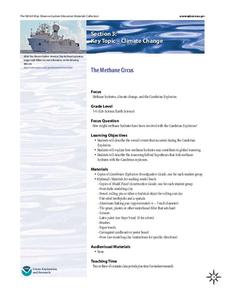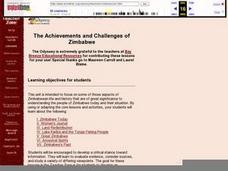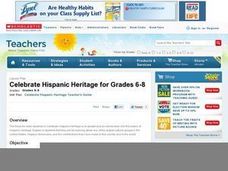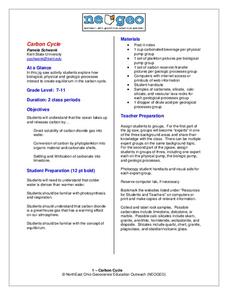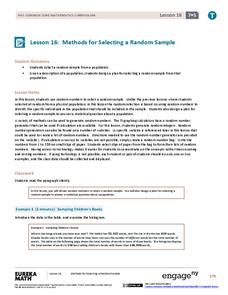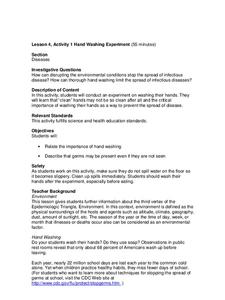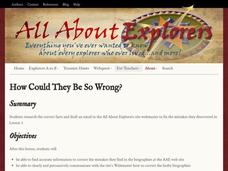Science Matters
Landforms from Volcanoes
Three major types of volcanoes exist: cinder cone, composite/strata, and shield. The 18th lesson in a 20-part series covers the various landforms created from volcanoes. Scholars work in pairs to correctly identify the three types based...
NOAA
Journey to the Unknown
What's it like to be a deep-sea explorer? Tap into the imaginations of your fifth and sixth graders with a vivid lesson, the second part of a six-part adventure. Learners close their eyes and submerge themselves in an expedition aboard...
National Endowment for the Humanities
Kate Chopin's The Awakening: Local Color in the Late 19th Century
Kate Chopin's The Awakening introduces readers not only to the lush Louisiana setting of Grand isle but also to the nuances of Creole culture. the second instructional activity in a three-part series examines how Chopin's use of literary...
Ohio Department of Education
Observe Then Infer
To develop their skill at drawing inferences from observations, sixth graders rotate through six stations, conduct a series of experiments, make observations, and draw inference from what they observe.
School Improvement in Maryland
Regulatory Agency
Five governmental regulatory agencies are tasked to respond to market failure. Groups investigate the roles of each of these agencies as well as the social, economic, and political impact of their actions.
Federal Reserve Bank
Cash Flow and Balance Sheets
What is your car worth? How much do you owe? Individuals create their personal cash flow and balance sheets. They learn the difference between an asset and liability using their personal information to complete the activity.
Missouri Department of Elementary
The Successful Student: What's Your Style?
Everyone is different, and they learn differently, too. After discussing what it is to be a good student, class members participate in the next lesson that explores their individual learning styles.
NPR
Female Olympians Lesson Plan
For every strong and determined female Olympian, there are millions of young girls watching and becoming inspired. Middle and high schoolers learn more about record-breaking and history-making Olympian women with a presentation from the...
NOAA
The Methane Circus
Step right up! An engaging research-centered lesson, the third in a series of six, has young archaeologists study the amazing animals of the Cambrian explosion. Working in groups, they profile a breathtaking and odd creature and learn...
NOAA
Where Have All the Glaciers Gone?
What happens when ice melts? Well ... water happens. When that melting ice is a glacier, the amount of water that results produces change throughout the world. Middle school science sleuths uncover the truth about global warming, the...
NOAA
Oceans of Energy
Are the earth's oceans really just giant batteries, waiting for their energy to be harnessed? Middle school mechanical engineers will be shocked by the amazing amount of energy that forms around them after diving into part four of a...
NOAA
Microfriends
Is there medicine found in the organisms that live deep below the surface of the ocean? The fifth lesson in a six-part series has learners team up to research bacteria and the relationship it has with nearly every living thing on Earth....
NOAA
Build Your Own Ocean Ecosystem
Hold the sea in the palm of your hand! Amateur oceanographers work together to create models of an ocean ecosystem in the sixth and final installment in a series. Raise awareness of global ocean health issues through guided research,...
California Department of Education
Me and My Career
Your career search starts here! Sixth grade scholars begin their journey toward college and career readiness in the first of a five-part series of lessons. Individuals identify where their interests lead them using the Holland code, then...
Teach Engineering
What Does Light See?
The second installment of a seven-part series focuses on the refraction of light and how it affects the colors we see. Learners consider how this concept connects to biosensors for cancer detection.
AAAS
Identification and Classification of Grassland Plants
Take learning outside and start classifying grasslands. Young ecologists observe grassland plants in order to classify them into the appropriate species by family. They note their characteristics and where they grow. A true field...
Curated OER
The Achievements and Challenges of Zimbabwe
Here is an excellent set of five short lessons and activities intended to help learners not only gain an understand of current issues in Africa, but build critical thinking, synthesis, analysis, expository writing, research, and...
Centers for Disease Control and Prevention
Teach Mrs. Jones' Class about Microbes
During a biology lesson, scholars research microbes, design a lesson plan using an outline, and present the lesson to the class.
Curated OER
Celebrate Hispanic Heritage: Grades 6-8
To gain a better understanding of Hispanic heritage and culture, as well as to build informational comprehension skill, learners explore facets of Hispanic American History. They engage in a class discussion, research three facts, and...
NorthEast Ohio Geoscience Education Outreach
Carbon Cycle
Using a jigsaw approach, earth science experts teach each other about the physical, biological, and geologic components of the carbon cycle, with a specific focus on the ocean.
EngageNY
Methods for Selecting a Random Sample
Random sampling is as easy as choosing numbers. Teams use random numbers to create a sample of book lengths from a population of 150 books. The groups continue by developing a technique to create samples to compare from two populations...
Civil War Trust
Genealogy
The Civil War is undoubtedly a part of America's history, but could it be part of your pupils' history as well? Middle schoolers conduct research to discover a connection between their ancestors and the American Civil War. Whether they...
Centers for Disease Control and Prevention
Hand Washing Experiment
An engaging experiment allows scholars to understand why the recommendation is to wash for 20 seconds with soap and water — while making them aware of their own habits!
All About Explorers
How Could They Be so Wrong?
If it's on the Internet, it must be true ... right? Introduce young Internet explorers to the importance of fact-checking through a fun web-based activity. Pairs work together to read and analyze biographies about world explorers, then...
Other popular searches
- Create Teacher Websites
- Spanish Teacher Websites
- Medical Teacher Websites
- Teacher Websites K 2
- Teacher Websites Primary
- Agriculture Teacher Websites
- Teacher Websites Benefits
- Science Teacher Websites
- Health Teacher Websites
- Teacher Websites Critiques










